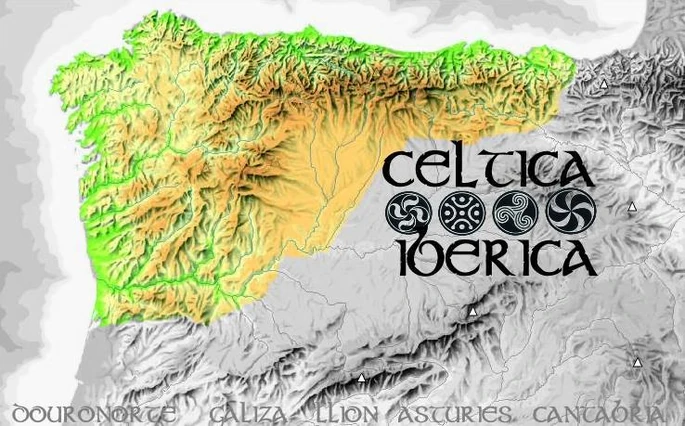
Kantabriagu, a sister language to Galeiga, is the revived form of the ancient Celtic language of Northwestern Iberia known as Cantabrian. It's an Ibero-Celtic language with Ibero-Basque loans and a few exceptions for Latin, Gothic Arabic via the Ibero-Romance languages. Many Celtic words from Gallaic and Brythonic survive to this day in Cantabrian, Asturian, Galician and Portuguese, which have been incorporated into the language. There are also loans from Gaulish, Brythonic (Galicia was colonized by Britons during the Anglo-Saxon invasion of Britain) or from primitive Irish/Gaelic words that can be traced back to their Celtiberian equivalents. Galeiga and Kantábreih are seen as Western Celtiberian and Northern Celtiberian respectively. Kantábreih tends to be much more conservative in its morphology and has a significant Basque influence. The modern areas associated with these languages are Galicia (Gallaecia) and Cantabria. "Totz gena danga totz gena arma ez"; "a people without a language is a people without a soul".
Proto Cantabric: Cantabriaco tangua sena Cantabrias eni Toute-uφos Iberias esi, auota inte nouion to dumne nouie indi cantaiesti uicontis oinos.
Old Cantabric: Cantabriaco tangua sena Galaiciaco eni Tode-ufos Iberiaco esi, auoda noiona duune noieensat endi cantaisti ficonti oinos.
Middle Cantabric: Kantabriagu danga sena Galeigiaku Toðe-hoan Ibereaku ese, auda noioa do duunu noioentzat kantaisea higonti oino.
Kantabriagu: Kantabriagu danga zen Galeiagu Totzehoan Ibéreagu ez, auda noioa dun noioentzat kantaiza higondi on.
Galeiga: Galeiga tãg séa aHaleia en Tozefó azIbérea es, ouda ã noiu dó doun noiu ã gandais figõd oen.
English: "Gallaic is the old language of Gallaecia in Northwestern Iberia, made anew for the new world of the twenty-first century."
Português: "Neo-Galaico é a lingua antiga da Gallaecia no noroeste da Ibéria, reconstruida para o novo mundo do século vinte e um."

-Name-[]
Kantábreia>Cantábria>Cantábri: Land of a Hundred Hills. "Canta" (hundred) + "Bria" (hill).
Kantábrei>Cantábrega>Cantábrica: Of the Cantábri
-Phonology-
all vowels (a,e,i,o,u) are pronounced much the same as they would be in Galician or Asturian, stressed vowels (á,é,í,ó,ú) are elongated and take the word stress, diphthongs take the stress in words as well.
z - /s/
ll - /lj/ (pronounced like the Portuguese "lh")
k - /k/
g - /g/
j - /j/
tx - /tʃ/
h - /x/, /h/
in(vowel) - "iñ_" (Vínu is pronounced "víñu" <vínhu>)
-Historical Sound Changes-[]
| Proto Celtic | Gaulish | Celtiberian | Gallaecian | English |
|---|---|---|---|---|
| wer- >uɸer | uer | or | or | over |
| ouxs | ux | os/us | os/us | up |
| uɸo | uo | uo/vo | uo/ua (vo/va, fo/fa) | under |
| eɸiro- | eron | ero | eru | after |
| geno- | genos | genos | enus | born |
| sego- | segos | segos | seus | victory |
| brig- | brix | briga | bri/bria | fort/elevated |
| widu- | uidus | uidus/vidus | fidus | wood |
| tarwo- | taruos | taruos | tarvus | bull |
| anman- | anuan | alman | alman | name |
| kʷenno | pennon | cennon | cennun | head |
| rextu- | rextus | retus | retus | right |
| dumno- | dumnon | dunon | dunun | world |
| swexs | suex | sues | sues | six |
| wlana- | ulana | lana | ulana | wool |
| ɸlano- | lanos | lanos | lanus | field/full |
| duxtir | duxtir | duater | duater | daughter |
| rig- | rix | ri | ri | king |
-Lenition and Compound Words-[]

Lenition in Kantábreiha is purely hypothetical and has been applied here in a limited manner, there being some evidence for it in the continental Celtic tongues. Lenition is applied at a mutation of the initial letter of the second word in compound words and when a personal pronoun is attached to a preposition.
Consonant Mutation Pairs
z>tx
b>m
c>g
g>h
d>tz
t>ts
l>ll
m>v
n>ñ
Compound Lenition (Adjectives and describing nouns precede nouns in compound words)
Kurmidegu - Kurmi + Tegu (Tavern, "beer house")
Aurgurmi - Aur + Kurmi (Cider, "apple beer")
Tentsur - Ten + Dur (Liquor/Spirits, "firewater")
Hinugar - Hinu + Kar (Grape, "wineberry")
Kenan - Ken + -an (Brain, "in head")
This also applies to the plural form of body parts that come in pairs:
Ear: Kruz - Dagruz
Hand: Lam – Dallam
Arm: Brak – Damrak
Leg: Gar – Dahar
Foot: Troh – Dutsroh
Eye: Ok - Duok
-Plural Form-[]
The plural form of Kantábreiha is mostly regular, borrowing the plural suffix from Basque
Dog - Dogs: Kun - Kuñek
Cat - Cats: Gatu - Gatuek
Beer - Beers: Kuren - Kureñek
House - Houses: Teh - Tehek

-Examples-[]
"Kantábreih ezo."
"I'm Cantábrian."
"Vinoan vitzahta ez, kurenan launahta ez"
In wine there is wisdom, in beer there is joy
"Druvits ezo, ma kamen Druvitsahta ez."
I am a druid, my path is Druidry.
"Katzuraun ak zergarauna kurendehats rakamen. Allan kuren radehen ak kih matza raetsen".
A warrior and a huntress walked to a tavern. They drank a lot of beer and ate good meat.
"Urtsuna mu dó ez, umbiotz ma krets ez, Tiara mu nemetzón ez."
The universe is my god, nature is my faith, the Earth is my temple.
-Numbers-[]

0: zero
1: on - ona (oinos<oino<on - oina<ona)
2: du - da (dwei<dwe<du - dwa<da)
3: tri (tisris<tiris<tris)
4: ketur (kwetru<ketur)
5: kenk (kwenkwe<kenk)
6: zeiz (swexs<sweis<zeis)
7: zets (sextam<seita<zet)
8: oitz (oxtu<oitu<oitz)
9: nav (nawan<naua<nau<nav)
10: deh (dekam<deca<deh)
11: ondeh
12: dudeh
13: trideh
14: cedurdeh
15: kenkdeh
16: zeizdeh
17: zetseh
18: oitzeh
19: navdeh
20: vihont (wikonti<viconti<vihont)
30: vihont deh
40: duvihont
50: duvihont deh
60: trivihont
70: trivihont deh
80: cedurvihont
90: cedurvihont deh
100: cant (kantom<cantu<cant)
1,000: mil
1,000,000: millón
